蛾と私へようこそ #12, そして初めてのブログカーニバル. 数か月間ブログを書いてきたにもかかわらず、そもそも自分がどのようにして鱗翅目に夢中になったのかを正確に振り返って反映することはまだできていません。. これが起こった時間や場所を思い出すことは不可能です, and like many of my colleagues and I’m sure many of my readers, I had a butterfly net and “bug cage” in hand as soon as I could walk. When it comes to entomology I believe almost everyone falls in love at first with a large and striking insect. For me it was a butterfly, naturally. I can remember staring for endless hours at the diversity of Ornithoptera and Papilio illustrated in Paul Smart’s famous book. Somewhere along the way in pursuit of something new I began to stray into the nocturnal world. Moths comprise the majority of the diversity of Lepidoptera; while there are nearly 11,000 species in the United States, only a few hundred are butterflies. This quickly opened a door (maybe into an abyss…) to the shocking abundance found everywhere around us. This amazing diversity has now drawn me deep into the biology and evolutionary history of the Lepidoptera. Editing these fourteen contributions of moth blogging together I just can’t help but to reflect back on some of my own mothing journey.
Perhaps if I was a child in Europe this moth (Deilephila elpenor porcellus) would have been the first to catch my eye. Over at Urban Moths Ron Laughton has discovered the stunning diversity in his own back yard in much the same way as I did growing up here in the US. Take a look at the types of traps he has been using, most of which he constructed himself. One of the best behaviors of moths is their willingness to dive headlong into the light. Not too far from Ron, Mike Beale has been blogging british moths as well. It can be pretty amazing just how similar our two faunas are (a few moths actually ある the same).
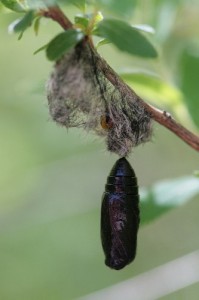 One of the more exciting steps for any moth enthusiast is learning how to rear them from caterpillar. On Seabrooke Leckie’s blog, The Marvelous in Nature, she does just this. よく, not from caterpillar, but she discovers a pupae hanging from a twig and brings it home to await the moth. A few days later something appears…but not from the pupae she thought she had! As it turns out she inadvertently collected a second pupae of a microlep successfully hidden amongst the leaves, which is not all too uncommon. As for Seabrooke’s first pupae, it had a different fate – to be parasitized by an Ichneumonidae. As a child I remember rearing caterpillars of Eacles imperialis only to be greeted by swarms of emerging Tachinid flies. Despite being sad over the loss of a stunning moth, our ecosystems would be worse for wear without these parasitoids.
One of the more exciting steps for any moth enthusiast is learning how to rear them from caterpillar. On Seabrooke Leckie’s blog, The Marvelous in Nature, she does just this. よく, not from caterpillar, but she discovers a pupae hanging from a twig and brings it home to await the moth. A few days later something appears…but not from the pupae she thought she had! As it turns out she inadvertently collected a second pupae of a microlep successfully hidden amongst the leaves, which is not all too uncommon. As for Seabrooke’s first pupae, it had a different fate – to be parasitized by an Ichneumonidae. As a child I remember rearing caterpillars of Eacles imperialis only to be greeted by swarms of emerging Tachinid flies. Despite being sad over the loss of a stunning moth, our ecosystems would be worse for wear without these parasitoids.
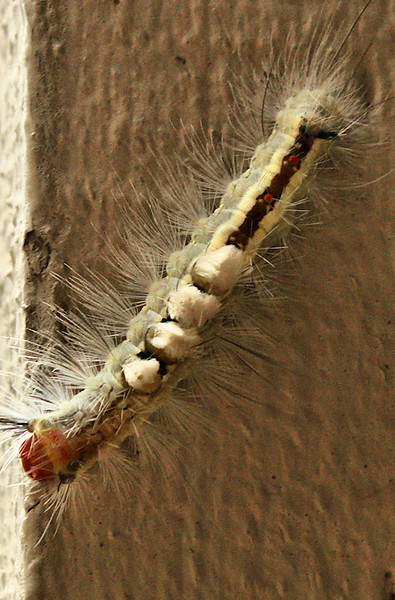 NSpeaking of caterpillars and backyards, Katie on 自然のID has found a tiny caterpillar of Lophocampa maculata, a tiger moth formerly known as the family Arctiidae (now it’s a subdivision of the larger Noctuidae). But boring taxonomy aside, they should prove easy to rear on willow. ザ adult moth somehow just doesn’t seem as impressive as the caterpillar. The same can be said of this Orgyia leucostigma (権利) caterpillar as captured by Xenogere, the adult is far less interesting. Aside from both being rather lack-luster adults, the Lymantriidae were also recently submerged back into the family Noctuidae! This is the double edged sword that is taxonomy; just as you become confident with your names, everything gets thrown up in the air and rearranged (not always arbitrarily!)
NSpeaking of caterpillars and backyards, Katie on 自然のID has found a tiny caterpillar of Lophocampa maculata, a tiger moth formerly known as the family Arctiidae (now it’s a subdivision of the larger Noctuidae). But boring taxonomy aside, they should prove easy to rear on willow. ザ adult moth somehow just doesn’t seem as impressive as the caterpillar. The same can be said of this Orgyia leucostigma (権利) caterpillar as captured by Xenogere, the adult is far less interesting. Aside from both being rather lack-luster adults, the Lymantriidae were also recently submerged back into the family Noctuidae! This is the double edged sword that is taxonomy; just as you become confident with your names, everything gets thrown up in the air and rearranged (not always arbitrarily!)
 Moving down in scale a bit, yet still strikingly beautiful, is the painted lichen moth – Hypoprepia fucosa. Over in the woods of Missouri Shelly Cox finds this beautiful little moth perched under a leaf. It was moths like these that began my journey downward into the smaller diversity of the Lepidoptera. Such a small moth can be so beautiful, you just have to look a little closer. Most moths, しかしながら, tend to be a little less expressive and look more like this one from NJ in March. Being a little drab however doesn’t make them less interesting, you just have to learn how to appreciate them differently.
Moving down in scale a bit, yet still strikingly beautiful, is the painted lichen moth – Hypoprepia fucosa. Over in the woods of Missouri Shelly Cox finds this beautiful little moth perched under a leaf. It was moths like these that began my journey downward into the smaller diversity of the Lepidoptera. Such a small moth can be so beautiful, you just have to look a little closer. Most moths, しかしながら, tend to be a little less expressive and look more like this one from NJ in March. Being a little drab however doesn’t make them less interesting, you just have to learn how to appreciate them differently.
Over on The Nature of Robertson blogger Denis Wilson explores a moth dear to my heart, the Hepilaidae. His backyard moth inspires a creation of art. Yet again, I am jealous of the impressive moths of Australia. Here in the US these moths are so rare that it took me over five years in the field to get my first. 信じようと信じまいと, this group was actually my introduction into the “マイクロ” 蛾, even if it was on a technicality. Micro by many (just to be confusing) can be used to indicate basal in the evolutionary tree of leps and not literally small…after all some Hepialidae and Cossidae can be monsters!
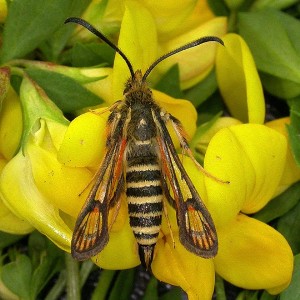 On the other hand, some moths can be pretty common yet difficult to locate, and require a special trick – pheromone lures. Mark Skevington takes his lure out on a warm day in the English countryside to track down some Sesiidae. One of my first jobs in entomology was at the Field Museum was sorting a massive collection of Sesiidae (donated in cigar boxes of course). Moths in this family have a long lifespan as larvae that bore into woody plants or trees. As a diurnal moth you can sometimes encounter them nectaring on flowers, しかし、注意してください, they are brilliant mimics of wasps!
On the other hand, some moths can be pretty common yet difficult to locate, and require a special trick – pheromone lures. Mark Skevington takes his lure out on a warm day in the English countryside to track down some Sesiidae. One of my first jobs in entomology was at the Field Museum was sorting a massive collection of Sesiidae (donated in cigar boxes of course). Moths in this family have a long lifespan as larvae that bore into woody plants or trees. As a diurnal moth you can sometimes encounter them nectaring on flowers, しかし、注意してください, they are brilliant mimics of wasps!
Mimicry is common in insects, and wasps are are often favorite model of moths, for good reason. Beetle blogger Ted MacRae over on ブッシュの甲虫 can even throw a moth at us once in a while. He also points out some fascinating behavior from a closely related species to the ones he found in Africa “An Australian species, Amata annulata, is known to regularly emit ultrasonic clicks when flying, thought to be aposematic behavior to warn bats of its distastefulness in the same way that that its coloration warns daytime predators”.
 NSometimes locating moths isn’t the issue, especially when they hide under your house. ザ Biobabbler encountered one of our invasive species while working on her chicken coop, the culprit was Noctua pronuba. Any European moth-er will quickly recognize this gaudy moth, but it is often confused for a カトカラ species here in the US. Introduced to the Nova Scotia area decades ago it has spread to nearly every state.
NSometimes locating moths isn’t the issue, especially when they hide under your house. ザ Biobabbler encountered one of our invasive species while working on her chicken coop, the culprit was Noctua pronuba. Any European moth-er will quickly recognize this gaudy moth, but it is often confused for a カトカラ species here in the US. Introduced to the Nova Scotia area decades ago it has spread to nearly every state.
 写真撮影 is a world unto its own, and capturing the perfect shot can be a hard fought battle. It was only this year that I picked up insect photography, and I’ve much to learn. Over on 蛾マジック the elusive Anania funerbris proved to be a difficult capture. I can relate to the often fruitless chase in hopes of that perfect shot. This spring I must have spent hours trying to photograph a beautiful purple Schinia…all to no avail. But in the end, the prize is beautiful.
写真撮影 is a world unto its own, and capturing the perfect shot can be a hard fought battle. It was only this year that I picked up insect photography, and I’ve much to learn. Over on 蛾マジック the elusive Anania funerbris proved to be a difficult capture. I can relate to the often fruitless chase in hopes of that perfect shot. This spring I must have spent hours trying to photograph a beautiful purple Schinia…all to no avail. But in the end, the prize is beautiful.
Next month’s issues of the Moth and Me will be hosted over at Today in NJ Birding History. Don’t forget to submit a posting before July 13, either to Jennifer or Seabrooke! Future dates for TMaM are still open, so don’t all rush to sign up at the same time.
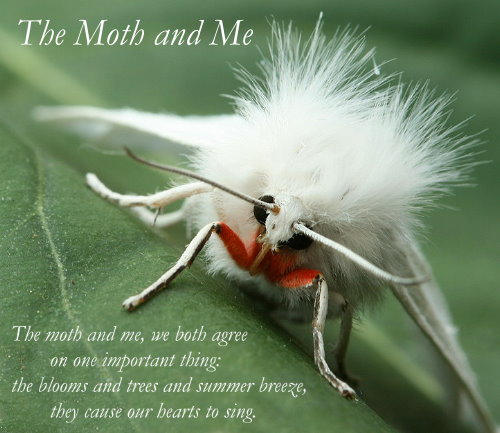


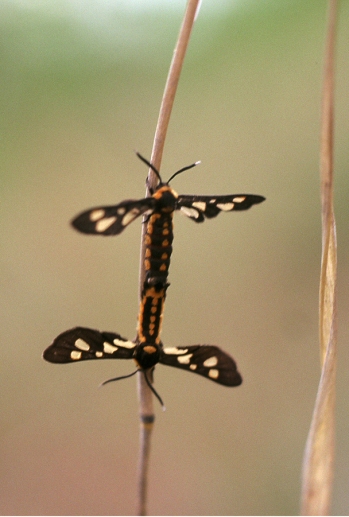

Nice presentation – well organized and pleasing visually. I’ve got my reading to do this weekend. 感謝!
こんにちはクリス,
Just a minor observation which I dont want to detract from what I think is a wonderful blog. Deilephila porcellus (Small Elephant Hawk-moth ) is the image you have used, as opposed to Deilephila elpenor – which is the Large Elephant Hawk Moth.
Love the blog 🙂
スティーブ.
オエーッと吐く, thanks for the correction!
ありがとう, クリス, for including me.
thanks so much for including my post! I haven’t been mothing much lately, but was bitten by the moth bug many years ago. I’m delighted to find your blog and will get a link up on my own right away. Good work on a great installment 🙂
I’ve fallen behind on my Mothy Mondays but hopefully will rectify that in the run-up to the next The Moth and Me carnival. Thanks so much for including my drab little harbinger of spring! I’m looking forward to enjoying all the other entries in this installment of the carnival too.
[…] Grinter at The Skeptical Moth joins the blog carnival host ranks with The Moth and Me #12. Chris is an entomologist at the California Academy of Sciences in San Francisco specializing in […]
[…] latest edition of The Moth and Me, #12, is up over at The Skeptical Moth. Chris has done a great job compiling the varied posts, in the […]
[…] latest edition of The Moth and Me, #12, is up over at The Skeptical Moth. Chris has done a great job compiling the varied posts, in the […]
[…] latest edition of The Moth and Me, #12, is up over at The Skeptical Moth. Chris has done a great job compiling the varied posts, in the […]